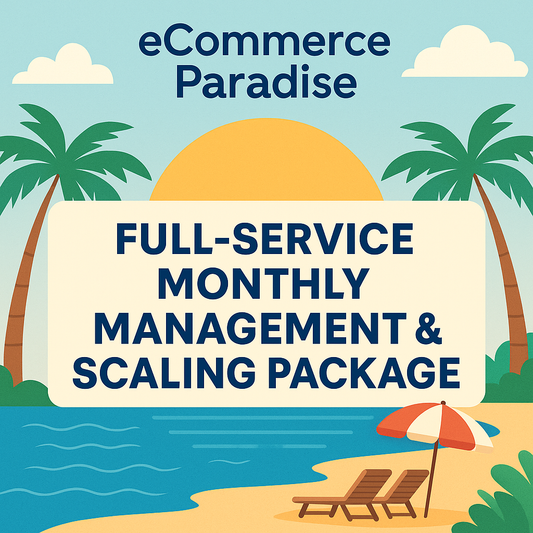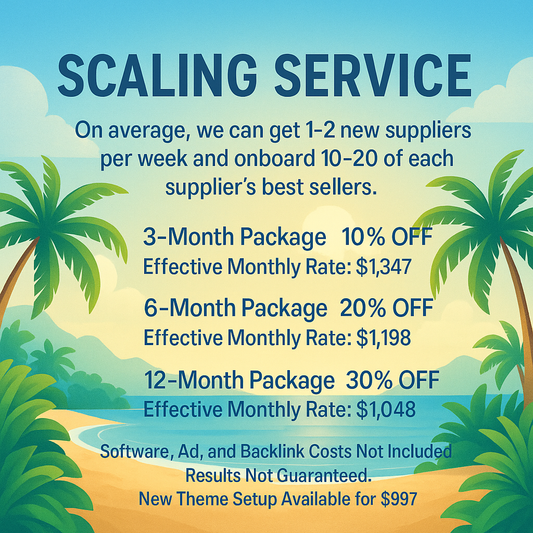
Mastering E-commerce Compliance: Your Ultimate Guide
As the founder of E-commerce Paradise, I know that diving into the world of e-commerce can feel like navigating a maze. With immense opportunities to build your business, especially through high-ticket dropshipping, it's just as important to stay compliant with the myriad of regulations governing this space. In this blog, I’ll walk you through key compliance factors you should stay on top of to ensure your dropshipping high ticket store thrives without a hitch.
Understanding E-commerce Regulations
First things first, let’s discuss what e-commerce regulations are. These regulations can include federal, state, and local laws that affect how you can run your online business. They cover various aspects, such as consumer protection, taxation, data privacy, and much more. Ignoring these regulations can lead to significant pitfalls for your business. From fines to damage to your brand's reputation, compliance is not something you can afford to overlook.
Consumer Protection Laws
Consumer protection laws are designed to ensure that the rights of consumers are upheld. These laws require you to deliver products as described, honor warranties, and provide clear return policies. When building your high-ticket dropshipping store, make sure that:
- Product Descriptions: Your product details are accurate and transparent. Misleading information can lead to unhappy customers and potential lawsuits.
- Return and Refund Policies: Clearly communicate your policies. Customers should be aware of their rights and how to return products.
Understanding Shipping and Fulfillment Regulations
The shipping process is vital in the e-commerce space, particularly in high-ticket dropshipping. You'll need to familiarize yourself with regulations relating to shipping, including:
- International Shipping: Ensure you understand customs and duties regulations for the countries you are shipping to.
- Delivery Timeframes: Be honest about your delivery estimates. If delays occur, communicate clearly with your customers.
Tax Compliance in E-commerce
When you operate a dropshipping high ticket store, tax compliance should be on your radar. It's essential to understand the tax responsibilities that can vary significantly based on your business structure and location. Here are the crucial aspects to consider:
Sales Tax Obligations
Sales tax can be one of the most confusing aspects of running an online store. Understanding when and where you need to collect sales tax is crucial. Here’s what you need to keep in mind:
- Nexus: Your business has a tax nexus in any state where you have a physical presence, such as a warehouse or office. If you sell high-ticket items, you must register and collect sales tax in those states.
- Marketplace Facilitators: If you use a platform, such as Shopify, they may collect sales tax on your behalf, but you'll need to ensure your sales tax settings are configured correctly.
Income Tax Considerations
Income tax can feel complex. Depending on your business structure, you may need to file different forms and pay taxes on your earnings. Consider the following:
- LLCs vs. Corporations: Each business type has its tax implications. Research what’s most beneficial for your dropshipping high ticket venture.
- Deductible Expenses: Keep track of business expenses, as they can reduce your taxable income. This may include your website costs, advertising, and shipping expenses.
Data Privacy and Cybersecurity Compliance
In today's digital age, customers expect their personal information to be protected, and it’s up to you to ensure that data privacy laws are honored. This primarily involves understanding regulations such as the General Data Protection Regulation (GDPR) if you operate in or cater to European customers, as well as the California Consumer Privacy Act (CCPA). Here’s how to comply:
Privacy Policy and Data Protection
Transparency is critical when it comes to consumer data. Craft a clear privacy policy that outlines:

- Data Collection: Inform customers about the data you collect and why.
- Data Access: Allow customers to access their own data and request its deletion if they wish.
Secure Payment Processing
Utilize secure payment gateways that comply with Payment Card Industry Data Security Standard (PCI DSS) regulations. Being PCI compliant means you put in place measures to protect customer data, subsequently reducing the risk of data breaches.
Advertising and Marketing Compliance
As a dropshipping high ticket entrepreneur, promoting your products effectively can take your business to new heights. However, it's essential to maintain compliance in your marketing practices. Key considerations include:
Truth in Advertising
Make sure any claim made in advertisements is truthful and not misleading. The Federal Trade Commission (FTC) regulates advertising practices, and misleading claims can lead to penalties. Here are some specifics:
- Testimonials: Ensure they are genuine and not fabricated.
- Disclosures: When advertising through influencers or affiliates, clear disclosures are vital to inform consumers of the partnership.
Email Marketing Compliance
If you use email marketing to promote your high-ticket dropshipping store, make sure you comply with the CAN-SPAM Act. This includes:
- Opt-Out Options: Always provide a way for users to unsubscribe from your emails.
- Clear Subject Lines: Ensure your email subject lines accurately reflect the content of the email.
Staying Updated with E-commerce Regulations
One of the challenges of maintaining compliance is that e-commerce regulations are constantly changing. Consistent education and adaptation are necessary for your success. Here are some effective ways to stay informed:
Regular Research
Dedicate time each month to read up on changes in e-commerce regulations, particularly those impacting your dropshipping high ticket industry. Subscribe to reputable business blogs and podcasts that focus on e-commerce law.
Join Surrounding Communities
Join forums or organizations geared toward e-commerce business owners. These communities are a fantastic resource for sharing information and staying updated on regulatory changes.
Consult Professionals for Best Practices
Sometimes the best approach is to enlist the help of professionals. Engaging with legal advisors or compliance experts can help ensure that your business adheres to current laws without a hitch. Set up regular consultations to get tailored advice, especially if you're expanding your high-ticket dropshipping portfolio into new regions or products.
Set Clear Compliance Goals
As you navigate the complexities of compliance, set clear goals for your business. Consider a compliance checklist that you review on a regular basis, addressing existing issues and staying ahead of upcoming regulations:
- Have you reviewed your product descriptions for accuracy?
- Are your tax settings configured properly in your Shopify store?
- Is your privacy policy current and accessible?
- Are your marketing practices compliant with federal regulations?
Empower Your Dropshipping Journey
Staying compliant with e-commerce regulations is not only about avoiding penalties—it's about protecting your brand and building trust with your customers. As you embark on and grow your high-ticket dropshipping store, embrace these compliance strategies to create a sustainable, successful business model. Remember, knowledge is power, and by keeping yourself informed and proactive, you set the stage for long-term success. The e-commerce landscape may seem complicated, but with the right preparation and resources at your disposal, you can emerge victorious!


















